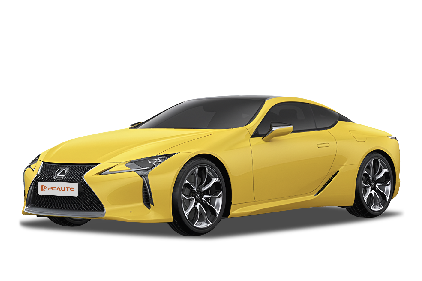Q
What is the 2020 LC 500 0-60 time?
The 2020 Lexus LC 500 hits 0-60 mph in around 4.7 seconds. This luxury GT coupe packs a 5.0-liter naturally aspirated V8 engine, cranking out 471 horsepower and 540 Nm of peak torque, mated to a 10-speed automatic transmission. The rear-wheel-drive setup delivers a smooth acceleration feel. For enthusiasts who love naturally aspirated engines, the LC 500's appeal lies in its linear power delivery and high-revving exhaust note, a stark contrast to today's popular turbocharged models. While 4.7 seconds isn't the quickest in its class, the LC 500 prioritizes the blend of driving dynamics and luxury. Its signature spindle grille and exquisite interior craftsmanship showcase that unique Japanese luxury aesthetic. Notably, the suspension is finely tuned to balance sporty performance with long-distance comfort, perfect for owners who value personality and taste.
Special Disclaimer: This content is published by users and does not represent the views or position of PCauto.
Related Q&A
Q
What is the 0 60 time for the 2020 Lexus LC 500?
The 2020 Lexus LC 500 clocks in at around 4.7 seconds for the 0-60 mph (approximately 0-96 km/h) sprint. This luxury GT coupe packs a 5.0-liter naturally aspirated V8 engine, cranking out 471 horsepower and 540 Nm of peak torque, mated to a 10-speed automatic transmission. The rear-wheel-drive setup delivers smooth, linear power delivery. The beauty of a naturally aspirated engine is that it unleashes strong power at high revs, along with a richer, more throaty exhaust note—perfect for drivers who crave genuine driving fun. While the LC 500’s acceleration might not be as blistering as some turbocharged rivals, its smoothness and responsiveness are where the naturally aspirated engine truly shines. On top of that, it comes with adaptive suspension and rear-wheel steering, taking handling stability up a notch. If you’re into a GT that blends luxury and sportiness, the LC 500 is a solid pick. Its interior craftsmanship and comfort features live up to Lexus’s usual high standards, making it a great companion for long drives with excellent ride comfort.
Q
How much oil does a 2020 Lexus LC 500 take?
The 2020 Lexus LC 500 has an oil capacity of approximately 8.2 liters, including the oil filter. It's recommended to use fully synthetic oil with a viscosity grade of 0W-20. This low-viscosity oil performs better in high-temperature climates and also helps improve fuel efficiency. Regular oil changes are crucial for maintaining the performance of that V8 naturally aspirated engine – typically every 10,000 kilometers or 12 months, but you should check the owner's manual for the exact interval. Keep in mind, if you often drive aggressively or in dusty conditions, you might want to shorten that oil change period a bit. When picking oil, aim for products with API SN or ILSAC GF-5 certifications; they offer more comprehensive engine protection. Also, it's a good idea to replace the oil filter when changing the oil to ensure proper filtration. The LC 500's oil filter is positioned for easy access, but if you're doing it yourself, watch the torque specs – over-tightening can damage the oil pan threads. If you're not familiar with the maintenance process, it's best to head to an authorized service center. They'll also check the condition of other key fluids like coolant and brake fluid while they're at it.
Q
How many miles per gallon does a 2020 Lexus LC 500 get?
The 2020 Lexus LC 500 has a combined fuel economy of around 19 miles per gallon (mpg), with approximately 16 mpg in the city and 25 mpg on the highway. Actual figures may vary slightly depending on driving habits and road conditions. Under the hood, it's powered by a 5.0-liter naturally aspirated V8 engine that delivers a robust 471 horsepower. While fuel efficiency isn't its strongest suit, it's a solid pick for drivers who want a mix of performance and luxury. Lexus has thrown in lightweight materials and aerodynamic tweaks to help boost fuel efficiency a bit, all while serving up a great driving feel and top-notch interior craftsmanship. If you're really big on gas mileage, the hybrid LC 500h is worth a look—it pairs a 3.5-liter V6 with an electric motor for better fuel economy. Whether you go for the LC 500 or the LC 500h, Lexus has a solid reputation for reliability and comfort, making either one a good fit for folks who want both luxury and driving fun.
Q
How much horsepower does the LC500 have in 2020?
The 2020 Lexus LC500 is powered by a 5.0-liter naturally aspirated V8 engine, churning out 471 horsepower and 540 Nm of peak torque. Mated to a 10-speed automatic transmission, it delivers smooth yet robust performance. This engine features Lexus' advanced D-4S fuel injection technology, combining Atkinson and Otto cycles to optimize fuel efficiency without sacrificing high-performance output. As a luxury GT sports car, the LC500 isn't just about raw power—it also prioritizes driving comfort and exquisite interior design, making it ideal for long journeys. The linear power delivery of the naturally aspirated engine and the unique V8 soundtrack are major draws too. Compared to turbocharged models, it offers more immediate throttle response and a purer driving experience. If you're into high-performance naturally aspirated engines, the LC500 is definitely worth considering—it strikes a fantastic balance between luxury and sporty performance.
Q
Does the 2020 LC 500 have a back seat?
The 2020 Lexus LC 500 is a high-performance luxury GT coupe that prioritizes driving enjoyment and elegant styling. That's why it features a two-door, four-seat layout. While technically equipped with rear seats, the actual space back there is pretty tight—adults will find legroom and headroom cramped, making it better suited for storing personal items or fitting a child safety seat. Powering this beauty is a 5.0-liter naturally aspirated V8 engine paired with a 10-speed automatic transmission, emphasizing linear power delivery and refined driving feel. The interior uses premium leather and aluminum trim, really upping the luxury ante. For folks who love long drives but occasionally need to carry passengers, the LC 500's rear seats work in a pinch. But if you regularly need to haul four people, you might want to check out a roomier four-door coupe or luxury sedan. Lexus has a solid after-sales service network in the local market, and owners get access to exclusive brand maintenance programs. These kinds of GT cars are typically for consumers who value personality and a top-notch driving experience.
Q
What engine is in the 2020 Lexus LC 500?
The 2020 Lexus LC 500 is powered by a 5.0-liter naturally aspirated V8 engine, codenamed 2UR-GSE. This engine features the D-4S dual fuel injection system, combining direct injection and port injection, churning out 471 horsepower (351 kilowatts) and a peak torque of 540 Nm. Mated to a 10-speed automatic transmission, it delivers linear yet robust power. Renowned for its strong high-rev performance and deep, throaty exhaust note, this V8 stays true to Lexus' commitment to naturally aspirated engines, making it a perfect fit for drivers who crave genuine driving pleasure. Notably, the LC 500 comes with rear-wheel drive and offers an optional Dynamic Rear Steering system, further enhancing handling agility. For enthusiasts of high-performance coupes, the LC 500's V8 isn't just a showcase of Lexus' craftsmanship in traditional powertrains; it's also one of the few remaining models in its class to stick with a large-displacement naturally aspirated engine. Plus, its reliable durability and low failure rate live up to the brand's usual high standards.
Q
Is 2020 a good year for Lexus?
2020 was a pretty solid year for Lexus, especially in the luxury car market where the brand kept up its strong competitiveness thanks to its reliability and high quality. That year, Lexus rolled out several updated models, like the new RX and ES series, which got noticeable upgrades in design, tech features, and comfort. The safety system, in particular, was upgraded to Lexus Safety System+ 2.0, adding more active safety functions—super useful for consumers who care about family cars. Plus, hybrid models like the RX450h and ES300h were popular too; they not only had great fuel economy but also fit with the eco-friendly trend. Lexus still had really high used car retention rates in 2020, which is a big plus for owners planning to keep their cars long-term. If you're thinking about buying a luxury car, the 2020 Lexus models are worth checking out, especially since their hybrid tech and after-sales service reputation have always been strong, able to handle both daily driving and long road trips.
Q
What is the resale value of a 2020 Lexus?
The residual value of a used 2020 Lexus depends on factors like the specific model, mileage, condition, and trim level. Generally, popular models such as the ES, RX, or NX hold their value well—after three years, they typically retain about 60% to 70% of their original price. Higher-end models like the LS or LC might depreciate a bit more, usually around 50% to 60%. Lexus is known for reliability and low maintenance costs, which helps keep resale values strong, especially for vehicles with complete regular service records. Hybrid models are also in demand locally because their fuel efficiency aligns better with long-term driving needs. For a more accurate estimate, check transaction data on local used car platforms or consult professional appraisal services. It’s also a good idea to thoroughly clean the vehicle and handle minor repairs before selling to boost the asking price. Keep in mind that used car prices can fluctuate based on market supply and demand, as well as new car promotions, so the actual selling price might vary.
Q
How much is insurance for a 2020 Lexus?
The insurance cost for a 2020 Lexus varies depending on factors like the model, engine displacement, owner's age, driving record, and coverage. Generally, a midsize sedan like the ES 250 might run around RM2,500 to RM4,000 annually, while an SUV such as the RX 350 could be a bit higher, roughly RM3,000 to RM4,500. For accurate pricing, you’ll need to check with insurance companies directly. Insurance calculations typically include third-party liability, comprehensive insurance, and add-ons like natural disaster or theft coverage. It’s a good idea to compare quotes and terms from different insurers to find the best fit for your needs. Also, as a luxury brand, Lexus parts and repair costs are relatively high, which is part of why insurance is a bit pricier. But its reliability and safety features offer better protection for owners, potentially reducing long-term unexpected repair expenses.
Q
What is the maintenance cost for a Lexus 2020?
The maintenance costs for a 2020 Lexus depend on the specific model and mileage driven. Generally, routine services like oil changes and filter replacements run around RM600 to RM1,000 per visit, while major services such as transmission fluid replacement and brake system inspections can cost between RM1,500 and RM3,000. As a luxury brand, Lexus maintenance fees are relatively high, but thanks to Toyota Group's parts-sharing strategy, some repair costs are more affordable compared to European competitors in the same class. It's advisable for owners to follow the official maintenance schedule (typically every 10,000 kilometers or 6 months), as this not only extends the vehicle's lifespan but also helps avoid expensive repairs caused by delayed servicing. Notably, Lexus has a well-established local dealer network, and factory-provided maintenance packages often include free inspections and warranty services, which can save on additional expenses in the long run. Hybrid models also require special attention to regular battery system checks; although the battery pack usually comes with an 8-year warranty, proper maintenance can further extend its service life. If looking to control costs, reputable third-party repair shops are an option, but it's crucial to use genuine or certified parts to avoid affecting warranty coverage.
Popular Cars
Model Year
Car Compare
Car Photo
Latest Q&A
Q
Do I need an alignment after rotation?
Whether a four-wheel alignment is needed after tire replacement depends on the actual condition of the vehicle. If only the tires are replaced and the vehicle has been driving normally without deviation, steering wheel vibration, or uneven tire wear, a four-wheel alignment is usually not required immediately, but wheel balancing must be performed to ensure stability when the wheels rotate at high speeds. However, if problems such as directional deviation, reduced steering precision, misaligned steering wheel, or abnormal tire wear (e.g., one-sided wear) occur after tire replacement, four-wheel alignment is necessary to adjust the geometric parameters of the suspension system (including caster angle, front wheel camber, etc.), thereby restoring the vehicle's straight-line driving stability and uniform tire contact with the road. Moreover, if chassis component repairs (such as suspension or steering system) are involved during tire replacement or the vehicle has been in a collision, four-wheel alignment becomes an essential step, as it can effectively reduce abnormal tire wear, improve handling safety, and lower fuel consumption. It is recommended to check the alignment parameters regularly every 20,000 kilometers or once a year. If you frequently encounter rough road conditions (such as curbs or speed bumps) during daily driving, the inspection interval should be shortened accordingly. Professional technicians can measure the data using specialized equipment and compare it with the manufacturer's specifications to determine whether adjustments are needed.
Q
Is it okay to rotate tires every 10,000 km?
Rotating tires every 10,000 kilometers is a reasonable and necessary maintenance measure, especially for fuel vehicles, as this frequency can effectively balance the wear difference between front and rear tires. Tire rotation involves regularly adjusting the installation positions of tires (e.g., moving front tires to the rear), which ensures more uniform wear across all tires, thereby extending the overall service life by approximately 20%-30%. For fuel vehicles, it is recommended to rotate tires every 10,000 kilometers, while for new energy vehicles, due to their greater weight and stronger torque output, the interval should be reduced to 8,000 kilometers. During rotation, the cross-rotation method should be employed (i.e., moving front tires to the opposite rear positions), and tire pressure should be checked simultaneously to ensure it meets the specified standards (2.3-2.5 bar for fuel vehicles, with an additional 0.2 bar for new energy vehicles). It is important to note that if a tire exhibits abnormal unilateral wear, bulges, or tread depth below 1.6 millimeters, simple rotation is not recommended and the tire should be replaced immediately. Regular monthly tire pressure checks and removal of debris from treads can further enhance tire performance and safety.
Q
What happens if you don't rotate tires?
If tire rotation is not performed regularly, it will lead to uneven tire wear, which in turn causes multiple problems. For front-wheel-drive vehicles, the front tires bear both driving and steering functions, so their wear rate is significantly faster than that of the rear tires; for rear-wheel-drive vehicles, since power is concentrated on the rear tires, the rear tires wear more noticeably. Long-term failure to rotate tires will shorten the overall tire life by 20%-40%—the front tires may be scrapped prematurely while the rear tires remain relatively new, resulting in resource waste. In addition, uneven wear reduces traction, particularly on wet surfaces, which can easily lead to skidding or a 10%-15% increase in braking distance, thereby elevating driving risks. Irregular wear also exacerbates tire noise and increases fuel consumption by 0.3-0.8 liters per 100 kilometers due to uneven rolling resistance. It is recommended to rotate tires every 10,000 to 15,000 kilometers. For front-wheel-drive vehicles, the cross-rotation method should be employed (left front to right rear, right front to left rear), while for rear-wheel-drive vehicles, the rear tires need to be crossed to the front. After rotation, tire pressure (the standard value typically ranges from 2.3 to 2.6 bar) should be verified and wheel balancing performed to prevent high-speed vibrations. If the tires exhibit irregular wear patterns or the tread depth falls below 1.6 mm, they should be replaced immediately. Regular tire rotation not only prolongs tire lifespan but also enhances fuel efficiency and driving safety. The cost of a single rotation is approximately 50 to 100 ringgit, substantially lower than the expense of premature tire replacement.
Q
Is it good to rotate car tires?
Tire rotation is an important maintenance measure to ensure even tire wear and extend service life. It is recommended to perform it every 5,000 to 10,000 kilometers or when uneven wear is detected. For front-wheel drive vehicles, the front tires wear faster as they handle steering and braking tasks, so they need to be cross-rotated with the rear tires (left front to right rear, right front to left rear). For rear-wheel drive vehicles, the rear tires should be diagonally swapped with the front tires to balance the wear of the drive wheels. If the tires have a directional tread pattern or asymmetric design, the rotation direction must be maintained, and only front-to-rear swaps on the same side are allowed to avoid affecting handling on wet and slippery roads. After rotation, the tire pressure should be adjusted to the standard for the corresponding wheel position, and it is recommended to perform dynamic balancing and four-wheel alignment simultaneously to optimize driving stability. Note that snow tires or studded tires cannot be rotated, and tires with different front and rear sizes can only be swapped left and right. Regular rotation can reduce abnormal wear (such as uneven wear or wavy patterns), improve grip and driving quietness, reduce safety hazards caused by tire problems, and save replacement costs in the long run. The specific operation should be based on the vehicle manual. If there is a lack of guidance, the cross-rotation method for bias-ply tires or the same-side rotation method for radial tires can be prioritized.
Q
How often should car tyres be rotated?
The replacement cycle of car tires should be determined by comprehensively considering factors such as service life, mileage, driving habits, and environmental conditions. Generally, it is recommended to replace them every 3 to 5 years or after 60,000 to 80,000 kilometers of driving, whichever comes first. As rubber products, tires deteriorate over time. Even if the mileage threshold hasn't been reached, immediate replacement is necessary when sidewall cracks, bulges appear, or tread depth falls below 1.6 mm (verifiable with a coin test) to ensure safety. Due to their heavier weight and stronger torque output, new energy vehicles experience accelerated tire wear. It is advisable to shorten the inspection interval to every six months, with urban commuting replacement mileage typically ranging from 42,000 to 56,000 kilometers. Regular tire rotation helps distribute wear evenly. For front-wheel-drive vehicles, front-to-rear rotation every 8,000 to 10,000 kilometers is recommended, while for new energy vehicles with higher front axle loads, this interval can be reduced to 6,000 to 8,000 kilometers. Additionally, maintaining cold tire pressure at 2.3 to 2.5 bar (add 0.2 bar for new energy vehicles) and avoiding aggressive maneuvers like rapid acceleration and hard braking can extend tire lifespan by 15% to 20%. Tires exceeding 6 years from their production date (identifiable via the DOT code on the sidewall) should be replaced regardless of apparent condition.
View MoreRelated News

Aerodynamic kit + Optimized V8 engine! Tom's Racing modified Lexus LC is so stunning?
MichaelJan 14, 2026

Lexus releases RZ 600e F SPORT Performance, 0–100 km/h acceleration takes only 4.4 seconds
JamesDec 26, 2025

Lexus GX550 is here, a luxury version of the Toyota Land Cruiser Prado, priced from RM 780,000
RobertDec 8, 2025

Rare big move, Toyota releases three sports cars: GR GT, GR GT3, Lexus LFA Concept
JamesDec 5, 2025

Rare move, Toyota will release three important models in one go on December 5th
AshleyDec 4, 2025
View More












 Cars
Cars




Pros
Cons